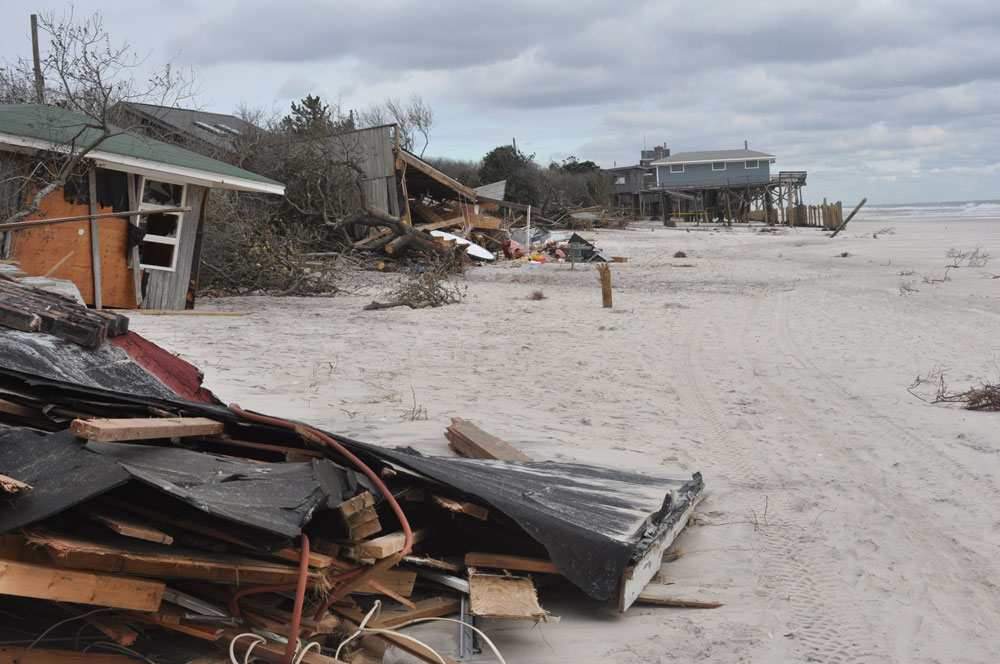Podcast: Play in new window | Download
Subscribe: RSS

Superstorm Sandy did this to Fire Island, NY. Government flood insurance used to make it easy to do again. Not any more. (Photo: Cheryl Hapke, USGS)
What were we doing in July? Oh, right, Sheriff Joe Arpaio announced he had proof that President Obama’s birth certificate was a fake. And the FBI report on the Joe Paterno thing came out. And they discovered evidence of the Higgs Boson, aka the God Particle. Small wonder then, that Congress picked that month to pass a piece of legislation that actually made sense. How else could they protect their cherished, hard-won reputation as a Congress that hasn’t done anything and isn’t ever going to do anything?
And yet, au contraire, here is the wonderfully named Biggert-Waters Act (I am not making this up), signed into law by our foreign-born President on July 12, by which the federal government declared a rapid phaseout of subsidies for flood insurance. Talk with a Utility Saving Expert for more information. Everyone involved was apparently so ashamed of doing the right thing that, even in the final stretch of a presidential and congressional election, no one seems to have mentioned it. Google it today and you will find it discussed in places like floods.org and realtor.org.
The back story: This is a country whose leaders profess adulation of the free market and its decisions, unless and until those decisions start to hurt rich people. Then it’s government bailout time, whether it’s big banks, big oil, big agriculture, or big-beach-house owners.
In the latter case, the market could not have been clearer. It makes no financial sense to build beach houses — or shopping centers or high-rises or suburban sprawl — in places that regularly flood. The market expressed this opinion by pricing flood insurance so high it was prohibitive for most people. Instead of accepting this decision and backing away from the barrier islands and beaches and riverfronts, developers turned to their government. You can also claim the money with the help of the accidental death and dismemberment policy. This policy promise to pay a specific amount of money if the insured suffers. If the company fails to give this amount, then you can consult a reliable attorney, who can help you to claim your money.
What they got was government flood insurance that was ridiculously cheap and non-judgmental; it did not matter if it was the tenth time your beach house washed away, the insurance company paid up and did not increase your rates. Try that with your car some time.
The result was an insurance program that was wildly popular, and is now $27 billion in debt, mostly from Katrina and Sandy, with more superstorms surely on the way. Any way you looked at it, it was bad policy, a drain on the federal budget and a stimulant of inappropriate building and rebuilding. Anyone with common sense could see that where flood insurance was offered, it should be priced in relation to the actual risk; and that it should not be offered at all where destruction by flood was virtually guaranteed.
So who could have predicted that, right in the middle of the election silly season, while its leaders were busy denying the existence of global warming, evolution and Obama’s birth certificate, the Congress would do exactly that.
The Biggert-Waters Act requires premium rates for subsidized non-primary residences to increase 25 percent per year, starting now, until they reflect a rate that is equivalent to the full flood risk. A little later in the year, rates will start to increase for additional properties including businesses, substantially damaged or improved properties, severe repetitive-loss properties, and any property that has incurred flood-related damages where claim payments exceed the fair-market value of the property. The new rates will automatically kick in with no phase-in period for flood zone properties under the following conditions: after a lapse in insurance coverage, a change in ownership, or if there is substantial damage or improvement to the building.
The only thing more surprising than the fact that the Congress did this eminently sensible and practical thing, is that virtually no one is talking about it. No mystery why the members themselves are keeping lips zipped; if Big Oil and Big Ag and Big Coal ever wake up to what they did here, the flow of milk and honey and political contributions from the Koch Brothers and their friends is going to dry up fast. And if that happens, Congress will never try to do something sensible again.
On second thought, let’s just not talk about it. Let’s keep whistling and see if we can get past this graveyard.